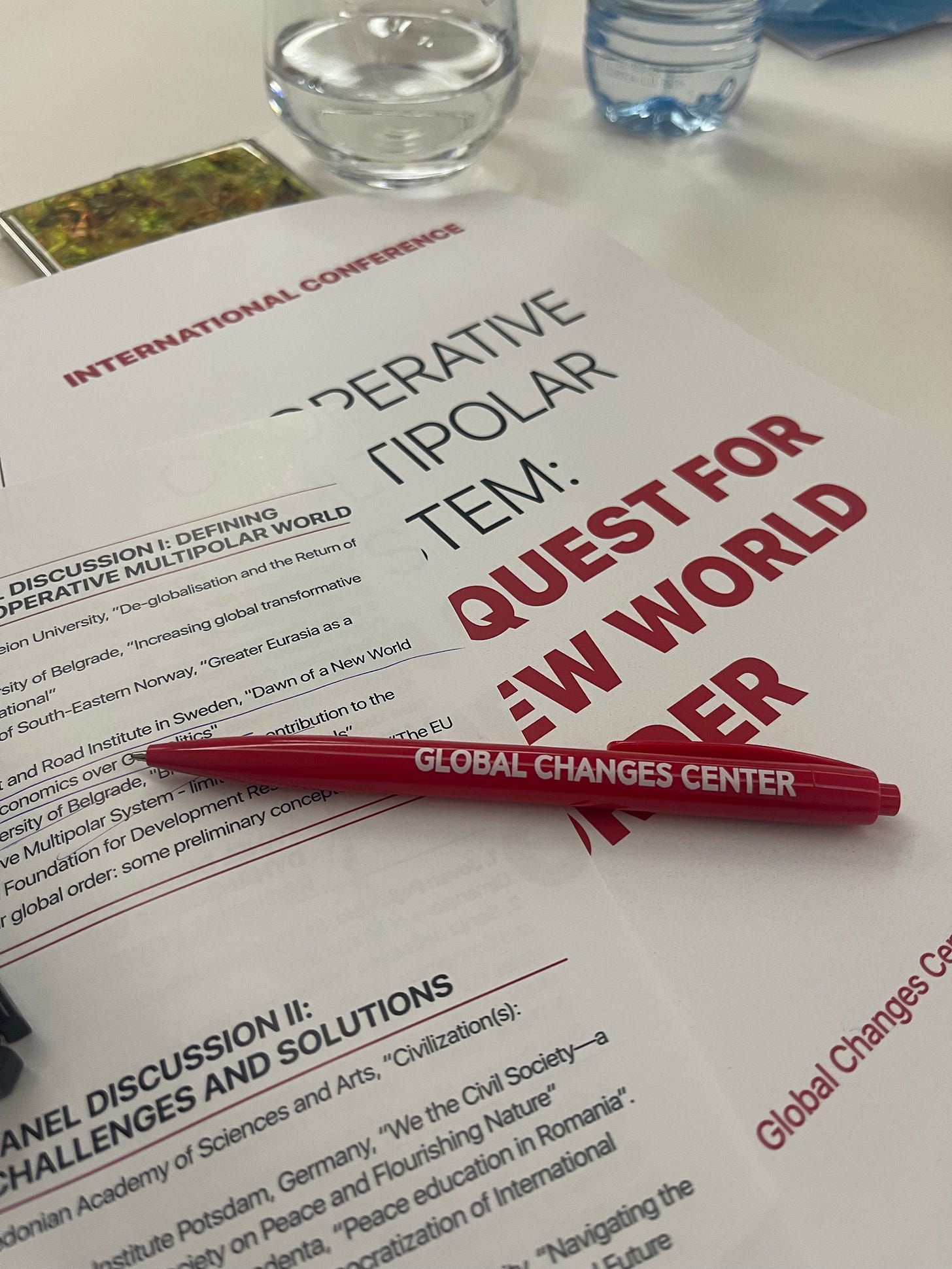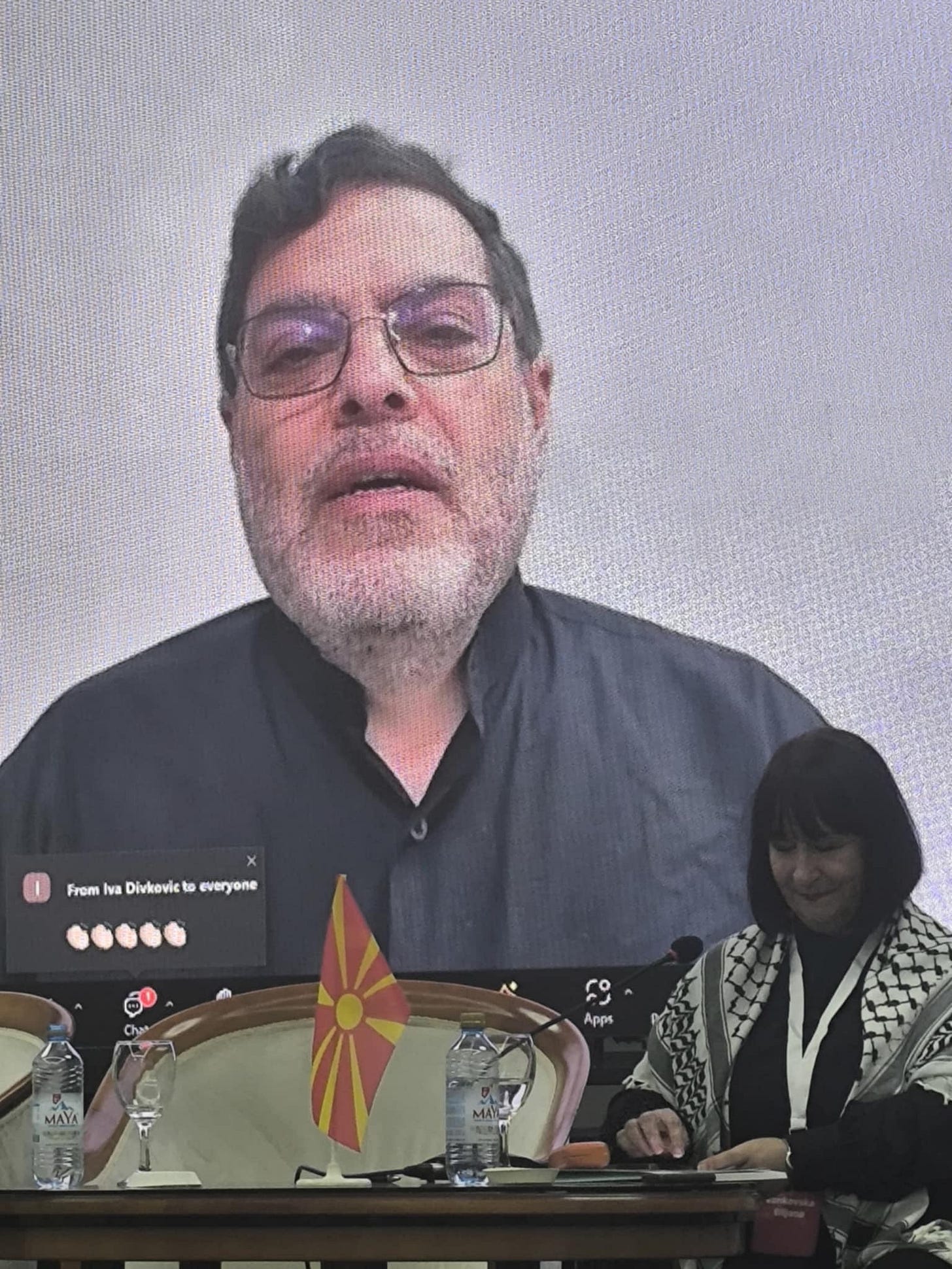What initially appeared to be a subtle and gradual militarization of academic spaces in Macedonia has now become glaringly evident. The 1.5-year-old Center for Global Changes, established at the Faculty of Philosophy, is seemingly on its deathbed. Was it unsuccessful? Passive? Ineffective? Quite the opposite. Just two months after hosting an extraordinary international conference on the emerging cooperative multipolar system in Skopje, Macedonia's capital, I have been dismissed as the head of the Center and now face accusations of alleged procedural violations—whatever that might mean. Paradoxically, the decision to remove me was made first, while its justification and final "verdict" are being crafted afterward to legitimize the absurdity.
My position as head of the Center was entirely unpaid, voluntary, and, to be honest, a demanding responsibility for a full professor. One might dismiss this as no great loss—personally, that might hold true. But in a broader context, this situation is emblematic of how a velvet glove can swiftly turn into an iron fist for those who dare to step outside the mainstream and challenge official narratives.
Almost two years ago, as a group of enthusiasts, we believed it was both possible and necessary to open new academic horizons beyond the increasingly restrictive geopolitical narratives that frame NATO and the EU as the ultimate and unquestionable goals for any initiative. The imposition of invisible barriers to global cooperation and the creeping censorship in public discourse and academia have been difficult to accept—especially for my generation, which once enjoyed freedom of thought and internationalism in former Yugoslavia. The same sentiment resonates with progressive younger generations who have grown up amidst the barren landscape of a neoliberal transition.
In the name of so-called Westernization—and under the banner of “our main strategic goals,” as the prevailing narrative puts it—academia in Macedonia has donned an invisible military uniform, embracing a militarized mindset. This shift has proven to be a highly profitable endeavor, securing project grants and facilitating rapid academic promotions. Within the paradigm of the military-industrial-media-academia complex, Macedonia may lack significant contributions to the first two dimensions, but its media and academic sectors tell a different story.
Financially dependent media outlets have aligned themselves with Western donors, willingly assuming the role of “watchdogs” against any perceived “undesirable influence” from countries in the Global South. The rise of “fact-checkers” merely represents a rebranding of censorship mechanisms reminiscent of earlier times. Meanwhile, academia has increasingly focused on militarizing the minds of young people—not to prepare them as soldiers, but as loyal promoters of Western narratives.
At the same time, peace studies—once established with the generous intellectual contributions of Nordic peace researchers such as Johan Galtung, Håkan Wiberg, and Jan Øberg—have gradually been marginalized, deemed “unpopular” in the current academic climate. In a broader context, the proliferation of NGOs and think tanks dedicated to identifying “fake news, disinformation, and malign foreign influence” reflects this shift. Unsurprisingly, these projects overwhelmingly point to Russia and China as the culprits, perpetuating a narrow and ideologically driven agenda.
In retrospect, the decision to establish the Global Changes Center and bring together scholars from across the globe was not only courageous and ambitious but, as perceived by Western power centers, profoundly subversive. The International Board included a distinguished group of thinkers—among them Richard Falk, Zhang Weiwei, Jeffrey Sachs, Mohammad Marandi, Jan Øberg, Alejandro Bendaña, Radhika Desai, Richard Sakwa, and many others.
The conference agenda was equally impressive, featuring scholars from Canada to South Africa, Russia, China, Iran, Germany, and beyond—many of whom participated either in person or virtually.
The Thinkers Forum shared a selection of these presentations on its YouTube channel, while the Global Changes Center posted the entire proceedings, offering open access to our discussions, visions, and goals.

Far from being a routine academic event filled with superficial rhetoric, this was a groundbreaking forum. As Prof. Richard Sakwa remarked, "It was one of the most stimulating and intellectually exciting events I had been to for a long time." Prof. Zhang Weiwei’s reaction was even more poignant: “Very shocked to hear this, but on the other hand, it's a testimony to what you've done right and to your contribution to the cause of peace and multi-polarity, which are deeply appreciated by all of us. Please count on our support in your continuous intellectual and political endeavor for a better and more peaceful and humane world.”
These endorsements speak to the profound impact and unique value of the Center and its work, highlighting why it has become a target of attempts to suppress alternative narratives and visions of global cooperation.
While I struggle to make sense of the absurdity of being punished for organizing a successful international event in a small and largely overlooked country, the deafening silence from my colleagues at the university speaks volumes. Their fear is palpable, and their silence tells a story of its own. Perhaps my “fault” lies in breaking unwritten rules by fostering unconventional academic connections over the past few months (with scholars from non-Western countries such as China, Russia, Iran, South Africa) —connections deemed “unpopular” by the prevailing narrative.
My travels to China, twice, and Russia, once, may have been enough to raise eyebrows, but attending and speaking at the Valdai Club likely tipped the scales. It seems the proverbial call for a witch hunt has been issued by Western mentors who seek to enforce rigid boundaries of acceptable academic discourse.
This is not to suggest that I, personally, am of such great significance. Rather, with my background, I make a convenient target—a cautionary tale to deter others from even considering stepping outside the prescribed lines. The message is clear: dissent, or even curiosity about alternative perspectives, will not be tolerated.
In my public response, I send a clear message: you may succeed in shutting down the Center, but the momentum of global changes is unstoppable. The multipolarity conference, a testament to the power of collective will, was made possible through crowdfunding—small yet meaningful contributions from ordinary citizens who instinctively recognize the reality of the West’s decline. These citizens, burdened by the decline in their daily lives, yearn for someone to be a voice for the voiceless.
The Political West, in its hubris, is accelerating its own implosion. What we are witnessing now is far worse than the tensions of Cold War I. While I await my final verdict—not just regarding my dismissal but the potential fate of the Center itself—my message to those orchestrating this campaign is resolute. To paraphrase Rosa Luxemburg: I was, I am, I shall be.
Freedom is always the freedom of the dissenter, and I will not be silenced. My commitment to international solidarity with all those oppressed and massacred remains unwavering. At the same time, I will continue working to lay the foundations for a new, more just, and humane world built on the ideals of true human brotherhood. Whether within small or broader networks, it is crucial not to be paralyzed or deterred. The future of humanity is worth any personal effort or sacrifice.






This conference was awesome btw